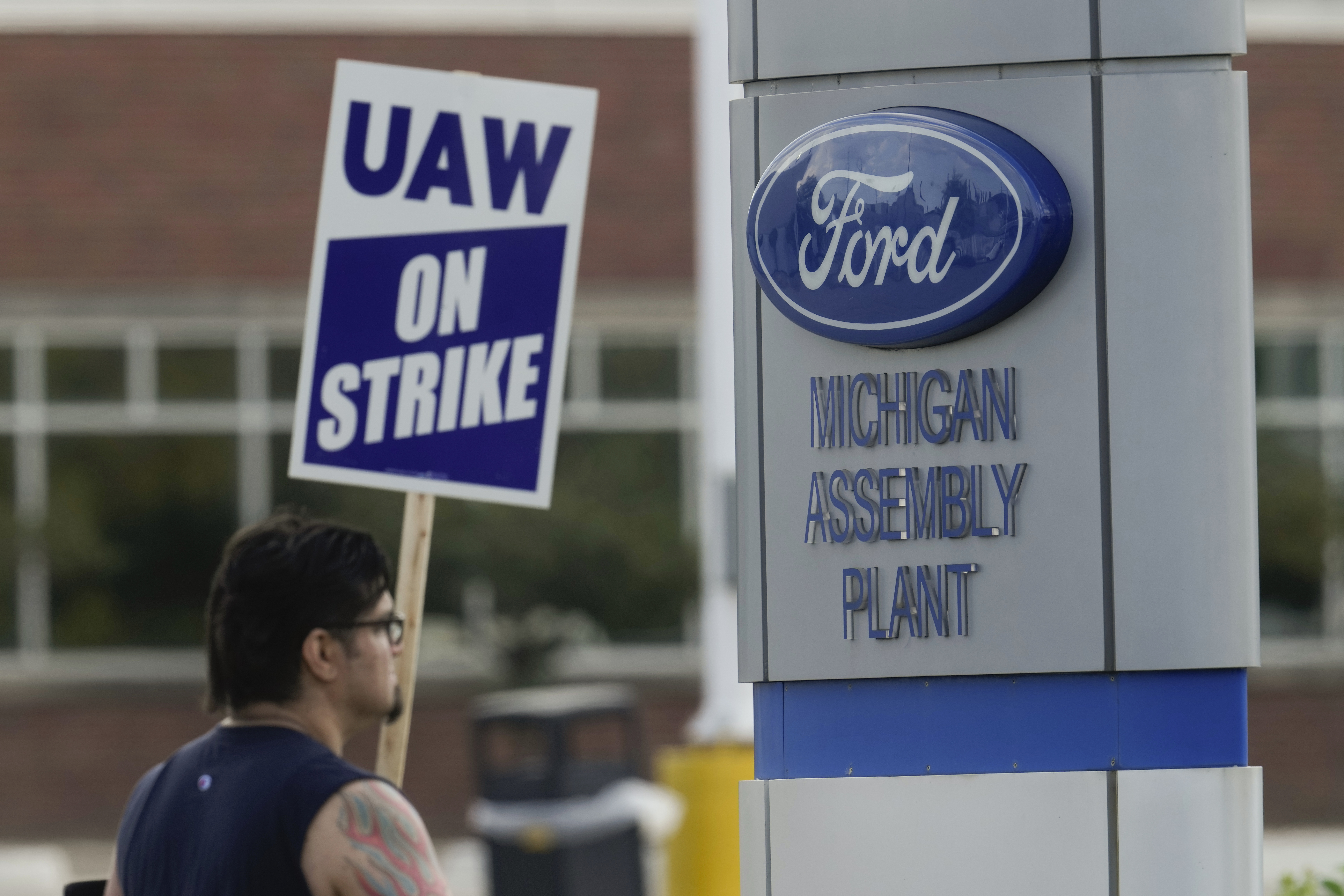Environmentalists support it because they support workers rights. Also, if you really care for the environment you know that EVs are not the solution and will never be the solution for the environment, just the car companies.
EVs are not THE solution, there is no one solution. EVs are a PART of the solution.
They have their part in the solution, but the more we rely on ev the less we do more important stuff like public transportation, walkable cities, proper zoning, less unnecessary office time, etc. If we remove every petrol car ever and just make them all ev we will still have an enormous problem, but while we doing that we necessarily neglect everything else. Making the society not car-centric is more important, that's where all the focus should be. Remaining cars should obviously be electric.
I don't know why you're being downvoted, you're right. Something as massive as climate change requires extreme change from us. A band-aid fix like EVs is only going to give the illusion of a solution. Reducing suburban sprawl and expanding mass transit will do much more for the environment than EVs ever could.
Yes, EVs are a good step, but they're little more than a compromise, we should be pushing to reduce our reliance on cars and semis as much as possible. The focus on EVs makes some people lose sight of this. People seem to be reluctant to change, holding out for some drop-and-swap fix that will solve everything. At the end of the day though, even the greenest car is way less energy efficient than the average bus, while also consuming much more road space per person.
We can do more than one thing, changing cars to ev does not distract from building more windmills.
This isn't about more windmills though, this is about EVs perpetuating the atomization and car dependency that got us into this mess, and thus being at best a band-aid fix and at worst preventing better solutions from taking form.
How would EVs prevent better solutions? You keep saying this but I don't understand why.
EVs are a distraction and driver funding from public transport options to spaces for cars. Cars need infrastructure such as traffic stops, crossings, parking, etc. And with metropolitan areas becoming increasingly crowded, all of this infrastructure takes up space and costs the city a lot of money as the land value rises.
For example, a car parking space where I'm from will cost something like $70/day. A shop double the size would be leased at $30k/month. Our rate money goes into subsidising the car parking spots because they need to sit somewhere where they're not being used.
EVs (in car form) still use the same spaces as cars and use up money that could be better spent on other things to improve city accessibility. That's a bit of the money part.
From an efficiency perspective, any kind of car (EV or otherwise), is extremely inefficient in Metropolitan areas because a large portion of the time is spent waiting in traffic. Any other type of transport moves more people per second than cars such as motorbikes, scooters, bicycles, trains, trams, buses etc. So, you're allowing a significant chunk of infrastructure to be occupied by an extremely ineffective mode of transport in a city of millions. If you remove the entire aspect of private vehicles in Metro areas, you free l suddenly free up a lot of space and increase efficiency for the other modes of transport.
EVs or cars would be useful in low density areas where the efficiency would be higher than using any other type of transport and would have a much more minimal impact on the climate than if large cities all used EVs.
We have the technology and the smarts to build a better world but we need to rip the band-aid off and understand that the problems that arise in our day to day is of our own making and that we can absolutely rebuild it from the ground up so that it is more sustainable.
If you remove the entire aspect of private vehicles in Metro areas, you free l suddenly free up a lot of space and increase efficiency for the other modes of transport.
But we don't HAVE those other means of transport, not nearly at the level to replace cars and not even at all in some places.
Your equation is basically "remove cars, replace with transit" but you're totally hand waving away the second part.
All the government subsidies to benefit EVs are a drop in the bucket compared to the cost of retooling infrastructure to support public transit. It needs to be done, but it can't be done quickly without a massive, exponential increase in funding, and EVs won't cover that gap.
Being anti-EV is being against one of the most useful, efficient, and effective ways of lowering ghg emissions we have.
Your idea of "ripping the bandaid off" leaves millions of people stranded while they wait for transit to be built.
We can do both and must do both. EVs for now, transit for future.
Funding is finite. Every bit of new EV-improvement research represents funding that could have been used elsewhere, like windmill-improvement research.
Most research is done by private companies. There are grants and tax incentives but they're a small amount of the overall green economy.
It absolutely distracts from building good not car-centric infrastructure, almost by definition. The mindset that the only problem with car-centric world is that they emit prevents north america from developing better way of organizing the places people live in. Windmills or not, concrete sprawl where you need to have a personal car to go everywhere is bad
First of all, that's a totally separate issue.
But secondly, we can still spend money on infrastructure upgrades to improve transit whole also supporting the switch to EVs. EVs for now, transit for future.
They're not though. EVs and their infrastructure are still very environmentally harmful.
It's minescule. Almost everything is at least a little bit harmful, including trains and buses.
Sure, those are LESS harmful, but they're also more difficult to implement.
We need more public transit, but we also need EVs to bridge the gap using the infrastructure we already have.
There actually is a single solution, but nobody wants to accept it.
Humility.
If we get rid of this self-serving attitude somehow, that we are all special and worth more than each other, then the rest like public transportation will all just make sense logically and fall into place.
Lol ok how is humility going to get me from home to work and back
Wtf is this churchy bullshit
Your response here is the problem
Bullshit that EVs aren't part of the climate solution. Cars will never go fully away, suburbs will never go fully away, rural areas where did is grown will never go away and EVs and green transportation tech needs to continue to advance and be part of the climate solution.
Rural areas could be not car-centric
Mass transit isn't going to plow and plant a a field there buddy.
What does that have to do with that, friend? Car doesn't do it either, specialised equipment does. We are talking about people moving around, not working equipment.
The fact that you work on a field or whatever doesn't mean that your village can't have a bus route and your town can't have a tram lineFair enough, let's delve into moving people in rural areas then if that's what you want to focus on and I'm going to focus on rural America, where I grew up where even to this day it's still less than 200 people in town and the cows outnumber the people.
There's been a ton of studies that show mass transit in rural areas don't work well, it's inefficient because of density, distance, and terrain. Rural America isn't the same as rural Europe, America is much, much more spread out. There have been some interest in more of the on demand services but they aren't exactly what you'd call mass transit more of a car pooling service, it kind of works but it's mostly there to service the elderly, which is another problem with rural America. Most places in Europe you're only a hour or two away from a major city, you don't have the same here and a bus isn't going to cut it and a train isn't going to happen even if America actually goes train happy because of distances, you'll need to get to a central location with a car to catch that train because that's how shit is just spread out in America.
You seem to think that each little town is self contained, here's the thing with a lot of rural America, it's isn't. My town I grew up in, my friends town 4 miles over isn't, my other friend 15 miles away isn't. Where we grew up the closest place with a grocery store was 20+ miles away and combine that with again density and terrain, since a lot of us, including myself didn't live in town, mass transit like your talking about isn't always feasible, convenient, or sustainable.
And again, it's not a stupid zero sum game here. Cars aren't going away anytime soon, face reality here, they're not and you can do more than one thing at at time to address climate change and EV's for people, for grain, for vegetables are part of that solution.
Bro like 80% of the population lives in/near cities.
One way you're another, you're going to need semis.
We are talking about people moving around, not working vehicles.
But also, if you have a good rail network you kinda don't need that many semis, if any. Specialised small vans will do the trick.
Environmentalism doesn't care that much about EVs, because road infrastructure is bad, but when driving really is necessary, EVs are better. Environmentalism supports the strike, because has since long realised that workers struggle similar fights, would be a great ally and might produce popular support for environmentalism.
Environmentalists care very much about EVs.
Yes. Specifically trains and ebikes.
Not personal vehicles no. Half the pollution of a car doesn't come out the tail pipe. EVs are a huge problem. Additionally the amount of EVs we'd need to make to compensate for all the cars out there is gigantic.
There is no good environmental argument for every household to continue to own a personal vehicle and to maintain and build the insane amount of infrastructure they need.
tldr; trains, buses, bikes unless there's a specific need like for manual labor or going to very low population places
There is no serious response to carbon emissions that does not involve electric personal vehicles.
I understand and support the world you want to live in, but that world is, at minimum, a century away.
I understand the world you want to live in, but EV production causes too many emissions for it to be a global solution. If we don’t make the kind of changes now that would normally take 100 years because we recognize the seriousness of the threat, no amount of EV production will save us.
Well I've got bad news for you, because the reality is that you need to amend your expectations
It also doesn't matter if factories pump out EVs if people can't afford them. That new electric vehicle on the lot won't help the environment if the person buying a car can only afford a used gas guzzler.
Why should we compromise on labor rights in favor of environmentalism? The latter wouldn't be such a problem if the former had been taken care of decades ago.
EVs don't save the environment, they save the car industry.
Car industry isn't going anywhere, regardless. Plus, do you really think vehicles with less maintenance and longer lifespans is going to save the industry?
If the alternative would be cutting production by 95%? Yes.
What gives you that idea?
EV != car. And even those have a use case. Having good EVs is necessary to wean off fossil fuels.
Are they implying that these corps would stop or slow making ev because some workers want more pay? Oh yeah you plebs want to be able to survive why do I destroy the planet see how you like that /s. Like we cant do both and it's zero sum.
Auto workers want to be paid a living wage rather then having all the money going to billionaire executives? Weird, it’s almost like the workers want a roof over their head and food to eat.
No shit? A strike would disrupt everything. That's kind of the point. This article is pure propaganda, appealing to environmentalists, techies, or whoever fancies EVs in an attempt to weaken the union's efforts to seek reasonable wages.
Shame on politico for sneaking this through by masquerading it as a blight against improving the environment.
A more honest headline:
Our corporate overlords don't like unions and environmentalists, so we're gonna pit those groups against each other.
deleted by creator
Wealth inequality is also among the biggest road blocks to climate action
Right. That's why record profits have accelerated EVs. /s. Don't fall for that nonsense.
You joke, but it has been shown that it's not the profits that accelerate EVs, it's the management that decides to accelerate EVs. Think about that when you see these union shops struggle against the non-union and highly profitable Tesla.
UAW and these legacy automakers don't deserve a happy ending when they're both self-interested at the end of the day.
… No. Shit. That's why I said what I said.








